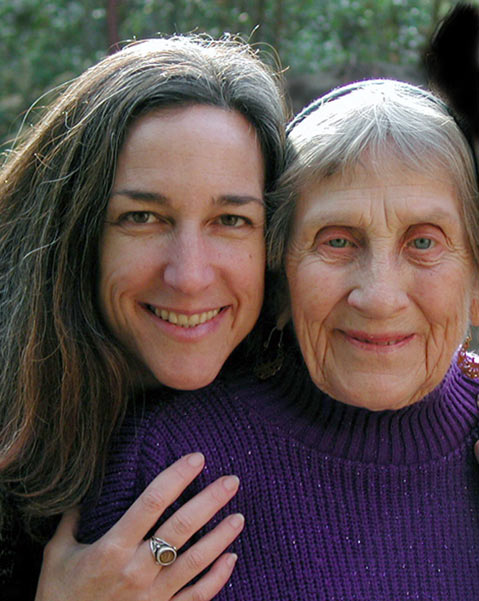Gene Knudsen Hoffman 1919-2010
Founder of Compassionate Listening
Gene Knudsen Hoffman, the founder of Compassionate Listening, died peacefully on July 19. Gene was a mother and grandmother, international peacemaker, counselor, Quaker, poet, actress, writer, and more.
Gene was my treasured mentor for the last eight years of her active life. Although I had lost her years before as her mind progressively rejected coherent patterns of recognition and communication, her death last week touched me deeply. I’ve been sifting and reading through a huge file of her letters, transmissions, and articles. Carrying around my three-inch-thick “Gene file” like a precious jewel, I have been amazed at her voluminous outpouring and sharing.
Some people never find or recognize their mentors in life. I am grateful that I found Gene, and that we both recognized the nature of our relationship.

In the early 1990s, I was leading citizen delegations to Israel and Palestine for the Earthstewards Network. I was frustrated that my work seemed to be adding to the polarization of the conflict in a part of the world where I had lived, and which I loved so dearly. I brought participants from the United States who were either pro-Palestinian or pro-Israeli; almost everyone seemed to be caught up with side-taking. I was having a hard time, and seeking a new framework for my efforts.
I found that framework in the writings of Gene Knudsen Hoffman, who had begun her international listening work in the 1980s in the former Soviet Union. After Glasnost, she turned her efforts to Israel and Palestine. As a young peace activist, I came across Gene’s articles and pamphlets regularly. We were both members of Fellowship of Reconciliation (FOR), an organization she had joined in 1952.
I finally called Gene in the spring of 1996, inviting her to join my next delegation and teach us how to practice what she called “compassionate listening” with Israelis and Palestinians. We met the following week and discovered an instant “soul sister” connection that bridged our 40-year age difference. We knew and loved the same people, the same projects, authors, and ideas. We shared similar experiences and feelings about our activist histories, including the anger and even hatred we had experienced within the peace movement. We acknowledged the challenges of working with our own self-righteousness.
Two of the people Gene considered her closest mentors were Adam Curle, a Quaker mediator, and Thich Nhat Hanh, a Buddhist monk. It was FOR that had sponsored Thich Nhat Hanh’s first U.S. and international speaking tour in 1966. In the mid ’80s, Gene organized his first retreat with Vietnam veterans. Gene wrote that she founded Compassionate Listening based on Hanh’s teachings “that we must listen to both sides of any conflict before we take actions. Ultimately through this process, we bring the two sides together for reconciliation.”
Gene developed a Compassionate Listening curriculum and began offering classes in Santa Barbara in 1988. I began to offer trainings in the U.S. the following year, using a different training model. By this point we were teaching what we called the “pure practice,” not focusing just on the Middle East but applicable to everyone in daily life.
A pioneer in a new field, Gene was always seeking to clarify and challenge her fellow peacemakers. In a letter to a colleague, dated June 3, 2000, Gene writes:
“About nonviolence: I question whether a gospel of nonviolence will save us. I think we have the doctrine, but not the necessary respect and concern for the unhealed suffering of oppressors and other violent people. It seems we rarely consider listening to them as a possibility for wider understanding. Instead, we have Nuremberg laws, and kill or otherwise destroy perpetrators through vengeance. We forget that Gandhi spent much of his time with his ‘enemies,’ listening to them and learning how to love them. I think it was his loving truth which was grounded in his respect for them as human beings that enabled them to set India free.”
Coming to terms with the limitations imposed upon her by her health, Gene eventually wrote to me that her “traveling days were over,” and requested to remain on the board of directors. In 2002, I founded the Jewish-German Compassionate Listening track with my German friend Beate Ronnefeldt, a trainer of Nonviolent Communication. In the last letter I received from Gene, dated April 10, 2004, she thanked me profusely for pioneering the Jewish-German work—a testimony to her passion for Jewish-German reconciliation. Gene, in the early 1990s, had researched and written extensively about Post Traumatic Stress Disorder (PTSD) among Jewish Holocaust survivors in Israel and the role of PTSD in the Israeli-Palestinian conflict. She had published articles on the subject, as well as a pamphlet, called “No Royal Road to Reconciliation.”
Compassionate Listening practitioners have a powerful lineage. Our work is infused with Gene’s research, study, and practice in the art of reconciliation, and we can continue to learn much from her articles and essays. I love to think of Gene’s delight, knowing how far her work has traveled—to conferences, universities, churches, synagogues, and meditation centers all over the world—and how many thousands have embraced her understanding of listening to those we consider the “other” or our “enemy.” We at the Compassionate Listening Project offer our deep respect and gratitude to the birth mother of our movement.



